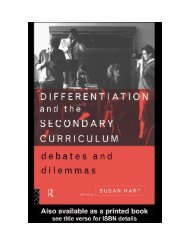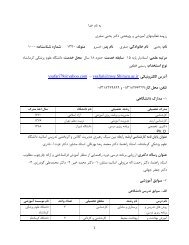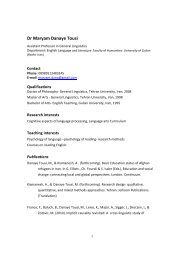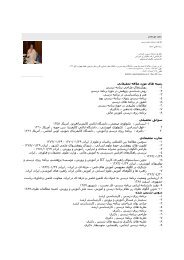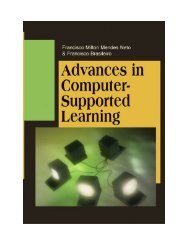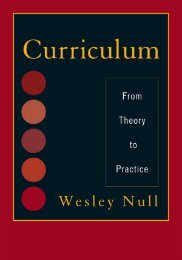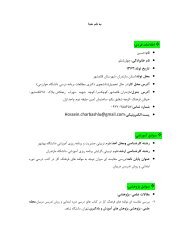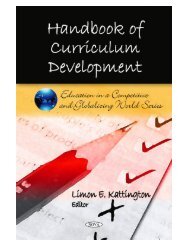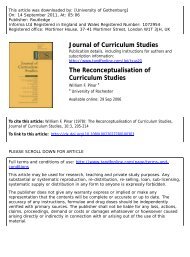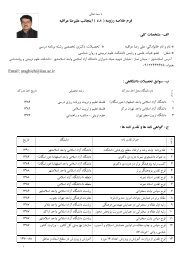JOHN DEWEY
JOHN DEWEY
JOHN DEWEY
You also want an ePaper? Increase the reach of your titles
YUMPU automatically turns print PDFs into web optimized ePapers that Google loves.
assume that the method will not work with our students, and that it will not with themgenerate ardour and practical energy?’ (ibid.).Dewey’s criticisms of other reformers were usually politely received, but changed fewminds. Few followed the ‘way out of educational confusion’ that he proposed. For mosteducators, it posed too great a threat to traditional methods and subject-matter. At the sametime, its social implications were too radical for advocates of scientific efficiency, and notradical enough for some proponents of social reconstruction. Furthermore, although it calledfor a revolutionary curriculum that would build on the impulses and interests of children, itwas too respectful of tradition and subject-matter to satisfy romantics. Thus, as the historianHerbert Kliebard has said, ‘his intellectual stature, his international reputation and his manyhonours notwithstanding, Dewey did not have enough of a true following in the world ofeducational practice to make his impact felt’ (Kliebard, 1986, p. 179).Had Dewey continued to believe that the teacher was ‘the usherer in of the truekingdom of God’, he might have been more distressed than he was that his pedagogicalarguments so often fell on deaf ears. However, after the First World War, the schools were nolonger the focus of his activism. This change reflected a less naive estimate of the place of theschool in social reconstruction, a substantial displacement of the classroom from the centre ofhis reform vision. What had once been to his mind the critical means for the democratizationof American life became one of a number of critical means, and one clearly secondary tomore overtly political institutions for public education. Dewey began to more openlyacknowledged that schools were inextricably tied to prevailing structures of power. Thereforethey were used as agencies for reproduction of the class society of industrial capitalism. Thusit would be extremely difficult to transform schools into an agency of democratic reform.Efforts to design them into more democratic institutions repeatedly ran afoul since their werepowerful forces that wished to preserve the existing social order. The defects of schoolsmirrored and sustained the defects of the larger society and these defects could not beremedied apart from a struggle for democracy throughout that larger society. Schools wouldtake part in the democratic social change only ‘as they ally themselves with this or thatmovement of existing social forces’ (Dewey, 1934, p. 207). They could not be viewed, asDewey had once been prone to see them, as the vehicle for an evasion of politics.Dewey’s legacyDewey’s philosophy of education came under heavy posthumous attack in the 1950s from theopponents of progressive education, who blamed him for virtually everything that was wrongwith the American public school system. Although his actual impact upon American schoolswas quite limited and conservative critics erred in confusing him with the progressives he hadhimself attacked, Dewey proved to be a convenient symbol of opprobrium for‘fundamentalists,’ worried about the decline of intellectual standards in schools and the threatthis posed to a nation involved in a Cold War with Communism. Following the launch of theRussian space satellite ‘Sputnik’, as two historians of the period have said, ‘the alreadyswelling outcry against the educational system became a deafening roar. Everyone joined in—the President, the Vice-President, admirals, generals, morticians, grocers, bootblacks,bootleggers, realtors, racketeers—all lamenting the fact that we didn’t have a hunk of metalorbiting the earth and blaming this tragedy on the sinister Deweyites who had plotted to keeplittle Johnny from learning to read’ (Miller & Nowak, 1977, p. 254). Since the 1950s,variations on this theme have become a regular, periodic feature of debate about the conditionof American public education, and each new call for a return to the ‘basics’ has brought withit some predictable Dewey-bashing. This type of criticism (as in the case of recent best-10



